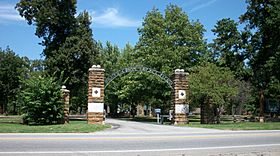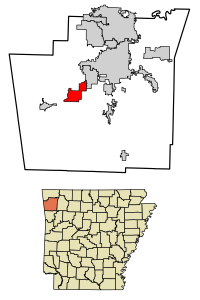Prairie Grove, Arkansas facts for kids
Quick facts for kids
Prairie Grove, Arkansas
|
||
|---|---|---|
| City of Prairie Grove | ||

Main entrance to Prairie Grove Battlefield State Park
|
||
|
||

Location of Prairie Grove in Washington County, Arkansas.
|
||
| Country | ||
| State | ||
| County | Washington | |
| Incorporated | July 9, 1888 | |
| Area | ||
| • Total | 9.33 sq mi (24.16 km2) | |
| • Land | 9.28 sq mi (24.04 km2) | |
| • Water | 0.05 sq mi (0.12 km2) | |
| Elevation | 1,184 ft (361 m) | |
| Population
(2020)
|
||
| • Total | 7,045 | |
| • Density | 759.08/sq mi (293.08/km2) | |
| Time zone | UTC-6 (Central) | |
| • Summer (DST) | UTC-5 (Central) | |
| ZIP code |
72753
|
|
| Area code(s) | 479 | |
| FIPS code | 05-57170 | |
| GNIS feature ID | 2404567 | |
| Website | http://www.prairiegrovearkansas.org/ | |
Prairie Grove is a city in Washington County, Arkansas, United States. In 2020, about 7,045 people lived there. It is part of the Northwest Arkansas area. The city is home to the Prairie Grove Battlefield State Park.
Contents
History of Prairie Grove
Prairie Grove was the location of the Battle of Prairie Grove during the American Civil War. In this battle, Confederate soldiers tried to stop two groups of Union soldiers from joining together. The battle ended in a tie, but it helped the Union keep control of northwest Arkansas. Today, the battlefield is a State Military Park.
A post office opened in Prairie Grove in 1867. The town was officially planned out in 1877. In the early 2000s, a 100-foot wind turbine was put up near Prairie Grove.
Between 1997 and 2001, there were some health concerns in Prairie Grove. Experts looked into why this was happening, but they never found a clear reason.
Geography
Prairie Grove is a city that covers about 2.1 square miles (5.4 square kilometers). All of this area is land.
People of Prairie Grove
| Historical population | |||
|---|---|---|---|
| Census | Pop. | %± | |
| 1890 | 412 | — | |
| 1900 | 551 | 33.7% | |
| 1910 | 774 | 40.5% | |
| 1920 | 861 | 11.2% | |
| 1930 | 743 | −13.7% | |
| 1940 | 887 | 19.4% | |
| 1950 | 939 | 5.9% | |
| 1960 | 1,056 | 12.5% | |
| 1970 | 1,582 | 49.8% | |
| 1980 | 1,708 | 8.0% | |
| 1990 | 1,761 | 3.1% | |
| 2000 | 2,540 | 44.2% | |
| 2010 | 4,380 | 72.4% | |
| 2020 | 7,045 | 60.8% | |
| U.S. Decennial Census | |||
Population in 2020
| Race | Number | Percentage |
|---|---|---|
| White (non-Hispanic) | 5,755 | 81.69% |
| Black or African American (non-Hispanic) | 52 | 0.74% |
| Native American | 122 | 1.73% |
| Asian | 76 | 1.08% |
| Pacific Islander | 5 | 0.07% |
| Other/Mixed | 580 | 8.23% |
| Hispanic or Latino | 455 | 6.46% |
In 2020, Prairie Grove had 7,045 residents. There were 2,175 households and 1,596 families living in the city.
Population in 2010
In 2010, the city had 4,380 people. There were 1,658 households. About 36.6% of these households had children under 18. The average household had 2.64 people.
Getting Around Prairie Grove
Public Transport
As of 2023, Prairie Grove does not have regular bus routes. However, you can use a service called Ozark Regional Transit to get around by calling for a ride. The closest place to catch a long-distance bus is in Fayetteville.
Roads
![]() U.S. Route 62 runs through Prairie Grove.
U.S. Route 62 runs through Prairie Grove. ![]() US 62B east – Prairie Grove
US 62B east – Prairie Grove ![]() US 62B west – Prairie Grove
US 62B west – Prairie Grove
Fun Things to Do
The annual Clothesline Fair happens in Prairie Grove. It has been celebrating local artists and craftspeople since 1951. This fair also includes a popular Labor Day celebration and reunions for families of Civil War soldiers. A Square dance competition has been part of the fair since 1958.
The two most famous places to visit are the Prairie Grove Battlefield State Park and the Telephone Booth. This old-fashioned phone booth from around 1960 still works! The city also has several historic buildings, like those on North Mock Street and the Southern Mercantile Building.
Schools in Prairie Grove
The Prairie Grove School District has four schools. These are Prairie Grove Elementary, Middle, Junior High, and High School. The school mascot is the Tigers, and their colors are Black, Gold, and White.
Famous People from Prairie Grove
- Jalen Beeks: A baseball pitcher who played for the Arkansas Razorbacks and in Major League Baseball.
- Maupin Cummings: A judge and politician who served in the Arkansas government.
- Mark Martin: He was the Arkansas Secretary of State and also served in the Arkansas House of Representatives.
- Margaret Pittman: A famous scientist who helped create and test the whooping cough vaccine. She was born near Prairie Grove in 1901.
See also
 In Spanish: Prairie Grove (Arkansas) para niños
In Spanish: Prairie Grove (Arkansas) para niños
 | Victor J. Glover |
 | Yvonne Cagle |
 | Jeanette Epps |
 | Bernard A. Harris Jr. |


